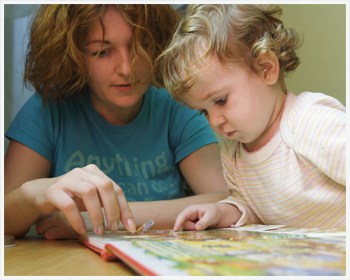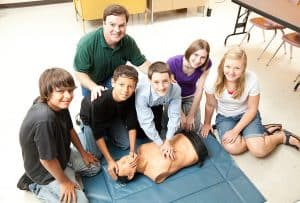Humor Me: Laughter Leads To Longevity
 Time and time again, studies have shown that people who have a positive outlook and find humor in everyday situations can actually live longer! A daily dose of belly laughs can improve your mental and physical state, making the case that laughter really is the best medicine.
Time and time again, studies have shown that people who have a positive outlook and find humor in everyday situations can actually live longer! A daily dose of belly laughs can improve your mental and physical state, making the case that laughter really is the best medicine.
Laughter boosts your immune system.
Positive thoughts and laughter help to release cells in the body that strengthen your immune system and fight illnesses, making you less likely to get sick. On the occasions when you do become sick, your body will be ready with the cells it needs to respond to the illness.
Laughter keeps your heart healthy.
After a good laugh, your heart rate and oxygen intake increase. This allows oxygen to flow more freely through your blood vessels and can reduce blood pressure levels. With improved function of the heart, your risk of a heart disease decreases.
Laughter releases endorphins.
The act of laughing triggers the release of endorphins, the body’s natural “feel good” chemicals. Endorphins play a big role in your mental health, connection with others and overall personal satisfaction, so the more giggles the better!
Laughter relieves stress.
When you laugh, you actively reduce the amount of stress hormones, known as cortisol, and inflammation found in your body. The entire body relaxes for up to 45 minutes after laughing, relieving muscle tension, improving your mood and reducing anxiety.
Laughter increases brain function.
The increased blood flow that results from laughing is also good for the brain. It can improve brain function and memory and help to combat depression. Laughter can also help improve coping skills and spark creativity.
Look on the bright side and start with a smile today! Get together with a group of good friends, watch a funny movie or comedian, play with your kids or grandkids, or spend time with a pet. You’ll be more apt to find humor in life and, in turn, reap the mental and physical benefits of laughter.
How To Instill Leadership Skills In Your Child’s Future
The role of a parent can often become quite hectic with the demands of daily life. Along this daily journey, many parents don’t realize their influence on their children’s minds. Our children watch as we balance these demands and lead the family through each day.
While leadership skills can come naturally, children learn lessons that significantly impact them later in life. The right words at the right time can make all the difference.
Here are five ways to help you instill the right leadership skills in your child’s future:
Be A Good Role Model
Be aware that your child is watching, and allow them to see how well you balance your business and personal demands each day.
You Win Some, You Lose Some
Great leaders handle failure as gracefully as they handle success. Emphasize perseverance. Your children must understand that success as a leader can be achieved through persistence, hard work, and a good heart.
Encourage Them To Talk
Allow your children to speak for themselves with servers at a restaurant, a grocery store clerk, or the lifeguard at the swimming pool. Through your guidance and allowing them to speak for themselves, this will help them gain confidence in themselves.
Bookworms Become Leaders
Studies have shown that children who read want to know more and ask questions to delve deeper into various subjects. This inquisitive side of a child is the best foundation for a leader’s growth.
Optimism Beats Pessimism – Every Time
Your child should be aware that optimism is connected to success. Reward optimism, especially when a goal is achieved.
In small ways, today’s leaders can prepare younger generations for their future as business leaders. These suggestions will create better leaders to help children perform better in school and develop better personal relationships.
Keep Calm And Carry On
It may be the most wonderful time of the year, but for many, it can also be the most stressful. Now that Thanksgiving has passed, the gears have switched and it’s time for holiday shopping, schedule-organizing and making travel plans, on top of end-of-the-year tasks at work and planning for 2023. With all there is to do, it’s no surprise if you’re having feelings of dread instead of feelings of joy. Try these calming tips to get through the busy season:
Set aside time for yourself. If you have children, work in an office and host family for the holidays, it’s likely that you don’t get much time to yourself, away from everyday noise. Setting aside 15 to 30 minutes in the morning as soon as you wake up, during your lunch or before bed may not seem like a lot, but it can give you the space you need to focus on yourself and read a book, meditate or work on a hobby.
Get some fresh air. Have you noticed the seasons changing and the leaves falling, or have you been too focused on tasks indoors to “stop and smell the roses.” The benefits of time spent in nature have been widely studied and documented, but we don’t always have the time to go on a hike. Next time you are leaving your house for work in the morning, or walking to your car after holiday shopping, stop and take a look around, breathing in the fresh air.
Stay organized. If you can’t mitigate stress with quiet time because you simply have so much to do, the best thing may be to tackle it head on. Sometimes the most soothing way to deal with a busy schedule is to make a list and watch as you cross items off throughout the day.
Fun Ideas To Make Your Child Smile!
 After a summer of fun and spending time together, it’s back to hard work and days apart from each other. Lunchtime offers your child a break from the busyness of the school day, and also offers a chance for you to make them smile, and even cheer them up in that adjustment period. While you may not be able to visit them for lunch every day, there are still a few ways to sneak a little love into this mealtime:
After a summer of fun and spending time together, it’s back to hard work and days apart from each other. Lunchtime offers your child a break from the busyness of the school day, and also offers a chance for you to make them smile, and even cheer them up in that adjustment period. While you may not be able to visit them for lunch every day, there are still a few ways to sneak a little love into this mealtime:
Write a note. Sometimes the easiest way to make someone smile is to write them a note and show you are thinking of them. It doesn’t have to be elaborate – a simple “I love you” or “Have a great day” will most likely do the trick if they are missing mom or dad during the school day.
Surprise them with a treat. What better way to make your child look forward to lunch and smile everyday than surprising them with a sweet treat, or even just a new kind of snack or sandwich? Go shopping together, or keep a cabinet up high filled with secret options to choose from so that every day is exciting for your little one when they open their lunch bag.
Pack it all up nicely. When you don’t have any special snacks stocked in your home to sneak in to your child’s lunch bag, sometimes the bag itself can be the treat. Get your child excited to see what you’ve packed for the day by letting them pick out a new exciting lunch bag for the year with their favorite cartoon or movie characters. The more compartments to explore and hide snacks in, the better.
Read To Your Child… Infant To PreK
 Did you know that reading to your children at a very early age often prepares them for success in Kindergarten and beyond? Yes, a simple and effective way to prepare our children for formal schooling is to read together on a daily basis. Children who are routinely read to from infant, toddler and Pre-K are much more academically prepared to learn than children who were not read to – AND – children who have been routinely read to enter kindergarten prepared to learn from the very first day! There is no to catch them up on skills.
Did you know that reading to your children at a very early age often prepares them for success in Kindergarten and beyond? Yes, a simple and effective way to prepare our children for formal schooling is to read together on a daily basis. Children who are routinely read to from infant, toddler and Pre-K are much more academically prepared to learn than children who were not read to – AND – children who have been routinely read to enter kindergarten prepared to learn from the very first day! There is no to catch them up on skills.
So how does reading aloud together prepare our children for kindergarten? When we read, think about all words that your child is hearing and beginning to understand before they enter the kindergarten classroom. Studies show that the number of vocabulary words a child knows upon entering kindergarten is an indicator of academic success in the years ahead. In addition, reading to our children also develops their listening skills and attention spans which is very important to success in a classroom environment.
Make Water Safety Your Priority
Swimming is the most popular summer activity. The best thing you can do to help your family stay safe is to enroll in age-appropriate swim lessons.
Follow these safety tips whenever you are in, on or around water.
- Swim in designated areas supervised by lifeguards.
- Always swim with a buddy; do not allow anyone to swim alone. Even at a public pool or a lifeguarded beach, use the buddy system!
- Ensure that everyone in the family learns to swim well. Enroll in age-appropriate Red Cross water orientation and Learn-to-Swim courses.
- Never leave a young child unattended near water and do not trust a child’s life to another child; teach children to always ask permission to go near water.
- Have young children or inexperienced swimmers wear U.S. Coast Guard-approved life jackets around water, but do not rely on life jackets alone.
- Establish rules for your family and enforce them without fail. For example, set limits based on each person’s ability, do not let anyone play around drains and suction fittings, and do not allow swimmers to hyperventilate before swimming under water or have breath-holding contests.
- Even if you do not plan on swimming, be cautious around natural bodies of water including ocean shoreline, rivers and lakes. Cold temperatures, currents and underwater hazards can make a fall into these bodies of water dangerous.
- If you go boating, wear a life jacket! Most boating fatalities occur from drowning.
Prevent Unsupervised Access to the Water
- Install and use barriers around your home pool or hot tub. Safety covers and pool alarms should be added as additional layers of protection.
- Ensure that pool barriers enclose the entire pool area, are at least 4-feet high with gates that are self-closing, self-latching and open outward, and away from the pool.
- The latch should be high enough to be out of a small child’s reach.
- If you have an above-ground or inflatable pool, remove access ladders and secure the safety cover whenever the pool is not in use.
- Remove any structures that provide access to the pool, such as outdoor furniture, climbable trees, decorative walls and playground equipment.
- Keep toys that are not in use away from the pool and out of sight. Toys can attract young children to the pool.
Maintain Constant Supervision
- Actively supervise kids whenever around the water—even if lifeguards are present. Do not just drop your kids off at the public pool or leave them at the beach—designate a responsible adult to supervise.
- Always stay within arm’s reach of young children and avoid distractions when supervising children around water.
- Know What to Do in an Emergency. If a child is missing, check the water first. Seconds count in preventing death or disability.
- Know how and when to call 9-1-1 or the local emergency number.
- If you own a home pool or hot tub, have appropriate equipment, such as reaching or throwing equipment, a cell phone, life jackets and a first aid kit.
- Enroll in Red Cross home pool safety, water safety, first aid and CPR/AED courses to learn how to prevent and respond to emergencies.
Contact the Training Support Center at 1-800-RED-CROSS or [email protected].
Source: http://www.redcross.org/get-help/prepare-for-emergencies/types-of-emergencies/water-safety
Five Ways To Celebrate Your Mom From The Heart

Last month we celebrated Mother Earth, and this month it’s time to celebrate mothers everywhere. If you don’t have something special planned for the mom in your life, now is the time to get thinking. This year, rather than buying the standard cards and flowers, why not celebrate mom from the heart? Here are a few suggestions:
1. Plan a day together.
Whether you’re an only child or have several siblings, planning a day together with your mom is one of the best ways to celebrate Mother’s Day. Ask her what she would like to do, or take her out to her favorite restaurant – either way, she most likely just wants to spend the day with the people she loves most.
2. Do something nice.
Sometimes the best gift to receive is someone else taking on task or chore that you’ve been putting off. Do something nice for Mother’s Day by getting chores done for her, completing a home repair or even just mowing the lawn.
3. Create something personal.
Gifts are always better when they are thoughtful and personal. Create something that reflects your mother’s personality or your time together – a photo book of your family, a basket with new tools for her favorite hobby or a self-care kit with bath bombs and face masks to relax.
4. Send her on a trip.
After years of caring for you, maybe it’s time to gift mom the vacation she deserves. Whether it’s down the street to the spa, or across the world, a trip is the perfect gift to show your appreciation for her love and care.
5. Keep it simple.
Not all mothers love gifts or grand gestures. If your mom prefers to keep it simple, sometimes just telling her how much she means to you is enough.
Safety First: What’s Your Plan?
At Home. A home safety plan is incredibly important if you have children, or even visiting family members. Make sure your first aid kit is well-stocked, and that every member of your family knows where to locate it. Keep a list of emergency phone numbers on the refrigerator, and review who to call in difference scenarios. Keep a fire extinguisher accessible, and become familiar with the instructions. Determine a “meeting spot” that every family member must head to if disaster hits suddenly. A home safety plan doesn’t have to be elaborate, but it could keep a bad situation from getting worse!

On Vacation. Whether you’re going to Disneyland, or a week at the beach, making sure your family is aware of a safety plan that can help avoid unsafe situations. Before you head off for your adventure, take note of weather conditions and any activities that could pose a potential danger to your loved ones, and it’s important to talk over a safety plan with your family – especially your children. For example, there may be a strong rip tide on any given day at the beach. A safety lesson of the dangers of a rip tide — explain what it is as well as what to do if caught in a rip tide — and show them the flag that flies to alert the dangers as well as their “safety contact” at the lifeguard station. If you are in a crowded area like a theme park, set a meeting place to gather in the event that someone is separated from your group. It is also a good idea to make note of emergency exits and medical facilities.
Every Day. Having a safety plan also means talking to your children about how to stay safe on a daily basis. For example: what should they do if a stranger tries to talk to them? Or even the importance of not looking down at their phone as they cross the street. For you, a daily safety plan may mean having a trusted friend, family member or neighbor who can watch your children in the event of an emergency, or even on a day when you are staying late at work. It could also mean knowing a few first aid basics, like how to help a child who is choking or enrolling your teen in a CPR class at the local hospital.
How To Help Kids Love Learning
Albert Einstein once said, “I have no special talent. I am only passionately curious.”
It’s well known that Einstein was never one for the classroom. While he excelled in many of his studies, school left him frustrated. He eventually dropped out of school when he was fifteen. His personal value of school aside, Einstein had something beyond the book of knowledge that drove his ongoing discovery of the world. He had grit, curiosity, and a thirst for learning that drove his brilliant advances in science and mathematics.
While we know that most of us don’t have an Einstein living under our roof, we do want our kids to have that same thirst for knowledge. As parents, we hope that our kids will discover a passion within them for a lifetime love of learning.
This love of learning starts at home in the environment we create for our kids at each phase of their life. Here are a few ideas to consider as you help your own kids value their education and develop a passion for discovering something new about their world.
LET THEM ASK QUESTIONS
At some point around the age of two or three, kids will start asking “why?”—all the time. And this pretty much doesn’t stop until they learn how to Google or ask Siri and don’t need to ask you anymore. As frustrating as all the “why” questions can be at times, asking questions is a good thing. Wonder and curiosity is something built within our DNA, but it’s something that must be cultivated throughout our lives. Giving kids a chance to ask questions, and tapping into their natural sense of wonder, lets them know that questions are an important part of learning and discovery.
ENGAGE THEIR INTERESTS
Let’s be honest. Not every kid loves school or learning, especially when they struggle with certain subjects. Other times, kids simply don’t have an interest in what they are being taught. Some gravitate towards math and science, while others excel in the humanities. Play to your kids’ strengths and engage their interests. Find way to help them learn what doesn’t interest them as much by tapping into what makes them tick. All kids are wired for fun, so make it fun. When we engage their interests and play to their strengths, we encourage a life-long love of learning in an area where they might have long term success as an adult.
ALLOW MISTAKES
We once had a teacher tell us that she actually likes when kids make mistakes because it gives her insight into how they’re learning and what she needs to do to help them succeed. When kids realize everyone makes mistakes when they are learning something new, and it’s part of learning, they will begin to value the process. Kids won’t be afraid to experiment and try new things when the weight of perfection is lifted. So create a culture in your family where everyone is trying new things, and where failure is okay. Even if you don’t succeed the first time—or the tenth time—you’re learning and growing, and hopefully having some family fun along the way.
MODEL LEARNING
It’s hard to expect our kids to value learning if we don’t demonstrate that we value it in our own lives. Talk to your kids about what you’re discovering as you read, complete work projects, or have compelling conversations with others. Learn something new and bring your kids in on the process. Ask questions and look things up together, read books or watch TED talks together, and discuss over dinner. Make learning a regular part of your home life.
INTERACT WITH THEIR TEACHERS
Even if your kids seem to be doing well in school, reach out to their teachers. Volunteer in the classroom. Find out what your kids are learning and have meaningful conversations about school. Other than home, school is where they spend most of their time. So partner with teachers to help your kids have the best experience possible. This also builds bridges with teachers, so if something comes up that needs to addressed, you have some relational equity that will help you navigate those conversations well.
You may discover your own way of helping your kids value learning. How ever you do that, always keep the spirit of fun. Learning something new will help you become better at whatever you do. That’s something to celebrate. Help make learning enjoyable and something your kids will strive to do the rest of their lives.
Source: http://theparentcue.org/how-to-help-kids-love-to-learn/
Aaa-chooo! Keeping A Healthy Home
 Even a seemingly clean house is still susceptible to viruses and bacteria that can affect the health of you and your loved ones. Fortunately, there are ways to combat these hidden dangers. Below are a few examples of the germiest places in your home and easy solutions for keeping them clean and sanitary.
Even a seemingly clean house is still susceptible to viruses and bacteria that can affect the health of you and your loved ones. Fortunately, there are ways to combat these hidden dangers. Below are a few examples of the germiest places in your home and easy solutions for keeping them clean and sanitary.
The Kitchen
Towels, dish cloths, sponges and countertops where food is prepped – all these areas are hot spots for germs. To combat them, put sponges in the dishwasher with the drying setting on, or zap wet sponges in the microwave for 1-2 minutes to kill bacteria. Use a fresh dish cloth every day, and sanitize in the washing machine with hot water in between uses. Wash out the sink with soap and hot water after preparing meals and washing dishes, and sanitize the sink, drain and counters with a bleach solution at least twice a week.
The Laundry Room
Did you know that there is a tenth of a gram of feces in every pair of soiled underwear? Because of this, underclothing should be washed separately in 150℉+ hot water. Move them to the dryer as soon as the wash cycle is done so germs don’t get a chance to multiply, and run it until everything is completely dry, which usually takes about 45 minutes. When you’re done, always wash your hands with soap and water and use a bleach solution on the washing machine’s tub.
The Bathroom
Your toilet bowl is not the only source of germs and bacteria in your bathroom. The flush handle on your toilet is often forgotten, and is one of the easiest ways to transfer sickness from person to person. The best way to cut down on bathroom germs is with weekly disinfecting of the floors, tub/shower floor and sides, and the toilet (including the flush handle).






